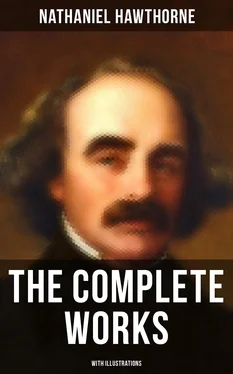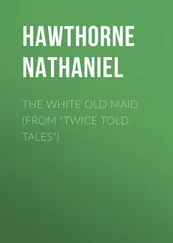“There is nothing but love here, Clifford,” she added, — ”nothing but love! You are at home!”
The guest responded to her tone by a smile, which did not half light up his face. Feeble as it was, however, and gone in a moment, it had a charm of wonderful beauty. It was followed by a coarser expression; or one that had the effect of coarseness on the fine mould and outline of his countenance, because there was nothing intellectual to temper it. It was a look of appetite. He ate food with what might almost be termed voracity; and seemed to forget himself, Hepzibah, the young girl, and everything else around him, in the sensual enjoyment which the bountifully spread table afforded. In his natural system, though high-wrought and delicately refined, a sensibility to the delights of the palate was probably inherent. It would have been kept in check, however, and even converted into an accomplishment, and one of the thousand modes of intellectual culture, had his more ethereal characteristics retained their vigor. But as it existed now, the effect was painful and made Phoebe droop her eyes.
In a little while the guest became sensible of the fragrance of the yet untasted coffee. He quaffed it eagerly. The subtle essence acted on him like a charmed draught, and caused the opaque substance of his animal being to grow transparent, or, at least, translucent; so that a spiritual gleam was transmitted through it, with a clearer lustre than hitherto.
“More, more!” he cried, with nervous haste in his utterance, as if anxious to retain his grasp of what sought to escape him. “This is what I need! Give me more!”
Under this delicate and powerful influence he sat more erect, and looked out from his eyes with a glance that took note of what it rested on. It was not so much that his expression grew more intellectual; this, though it had its share, was not the most peculiar effect. Neither was what we call the moral nature so forcibly awakened as to present itself in remarkable prominence. But a certain fine temper of being was now not brought out in full relief, but changeably and imperfectly betrayed, of which it was the function to deal with all beautiful and enjoyable things. In a character where it should exist as the chief attribute, it would bestow on its possessor an exquisite taste, and an enviable susceptibility of happiness. Beauty would be his life; his aspirations would all tend toward it; and, allowing his frame and physical organs to be in consonance, his own developments would likewise be beautiful. Such a man should have nothing to do with sorrow; nothing with strife; nothing with the martyrdom which, in an infinite variety of shapes, awaits those who have the heart, and will, and conscience, to fight a battle with the world. To these heroic tempers, such martyrdom is the richest meed in the world’s gift. To the individual before us, it could only be a grief, intense in due proportion with the severity of the infliction. He had no right to be a martyr; and, beholding him so fit to be happy and so feeble for all other purposes, a generous, strong, and noble spirit would, methinks, have been ready to sacrifice what little enjoyment it might have planned for itself, — it would have flung down the hopes, so paltry in its regard, — if thereby the wintry blasts of our rude sphere might come tempered to such a man.
Not to speak it harshly or scornfully, it seemed Clifford’s nature to be a Sybarite. It was perceptible, even there, in the dark old parlor, in the inevitable polarity with which his eyes were attracted towards the quivering play of sunbeams through the shadowy foliage. It was seen in his appreciating notice of the vase of flowers, the scent of which he inhaled with a zest almost peculiar to a physical organization so refined that spiritual ingredients are moulded in with it. It was betrayed in the unconscious smile with which he regarded Phoebe, whose fresh and maidenly figure was both sunshine and flowers, — their essence, in a prettier and more agreeable mode of manifestation. Not less evident was this love and necessity for the Beautiful, in the instinctive caution with which, even so soon, his eyes turned away from his hostess, and wandered to any quarter rather than come back. It was Hepzibah’s misfortune, — not Clifford’s fault. How could he, — so yellow as she was, so wrinkled, so sad of mien, with that odd uncouthness of a turban on her head, and that most perverse of scowls contorting her brow, — how could he love to gaze at her? But, did he owe her no affection for so much as she had silently given? He owed her nothing. A nature like Clifford’s can contract no debts of that kind. It is — we say it without censure, nor in diminution of the claim which it indefeasibly possesses on beings of another mould — it is always selfish in its essence; and we must give it leave to be so, and heap up our heroic and disinterested love upon it so much the more, without a recompense. Poor Hepzibah knew this truth, or, at least, acted on the instinct of it. So long estranged from what was lovely as Clifford had been, she rejoiced — rejoiced, though with a present sigh, and a secret purpose to shed tears in her own chamber that he had brighter objects now before his eyes than her aged and uncomely features. They never possessed a charm; and if they had, the canker of her grief for him would long since have destroyed it.
The guest leaned back in his chair. Mingled in his countenance with a dreamy delight, there was a troubled look of effort and unrest. He was seeking to make himself more fully sensible of the scene around him; or, perhaps, dreading it to be a dream, or a play of imagination, was vexing the fair moment with a struggle for some added brilliancy and more durable illusion.
“How pleasant! — How delightful!” he murmured, but not as if addressing any one. “Will it last? How balmy the atmosphere through that open window! An open window! How beautiful that play of sunshine! Those flowers, how very fragrant! That young girl’s face, how cheerful, how blooming! — a flower with the dew on it, and sunbeams in the dewdrops! Ah! this must be all a dream! A dream! A dream! But it has quite hidden the four stone walls!”
Then his face darkened, as if the shadow of a cavern or a dungeon had come over it; there was no more light in its expression than might have come through the iron grates of a prison-window — still lessening, too, as if he were sinking farther into the depths. Phoebe (being of that quickness and activity of temperament that she seldom long refrained from taking a part, and generally a good one, in what was going forward) now felt herself moved to address the stranger.
“Here is a new kind of rose, which I found this morning in the garden,” said she, choosing a small crimson one from among the flowers in the vase. “There will be but five or six on the bush this season. This is the most perfect of them all; not a speck of blight or mildew in it. And how sweet it is! — sweet like no other rose! One can never forget that scent!”
“Ah! — let me see! — let me hold it!” cried the guest, eagerly seizing the flower, which, by the spell peculiar to remembered odors, brought innumerable associations along with the fragrance that it exhaled. “Thank you! This has done me good. I remember how I used to prize this flower, — long ago, I suppose, very long ago! — or was it only yesterday? It makes me feel young again! Am I young? Either this remembrance is singularly distinct, or this consciousness strangely dim! But how kind of the fair young girl! Thank you! Thank you!”
The favorable excitement derived from this little crimson rose afforded Clifford the brightest moment which he enjoyed at the breakfast-table. It might have lasted longer, but that his eyes happened, soon afterwards, to rest on the face of the old Puritan, who, out of his dingy frame and lustreless canvas, was looking down on the scene like a ghost, and a most ill-tempered and ungenial one. The guest made an impatient gesture of the hand, and addressed Hepzibah with what might easily be recognized as the licensed irritability of a petted member of the family.
Читать дальше












